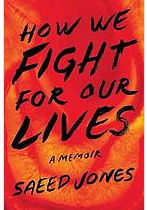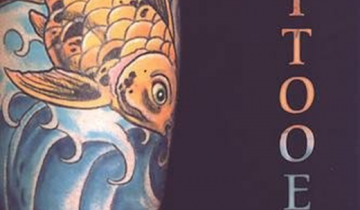Interview with the Author: Adrian Brooks
Associated book review: The Right Side of History: 100 Years of LGBTQI Activism
Adrian Brooks- a regular contributor to Lambda Literary- is a writer, performer, and Quaker activist, who has been engaged in progressive political, spiritual, and social movements for fifty years. In the 1960s, Brooks was an anti-war activist and a volunteer for Dr. Martin Luther King. Later, he participated in New York’s fledgling SOHO movement and became a radical gay liberation poet and performer/scriptwriter with the San Francisco “Angels of Light” free theater until 1980. A world citizen who has lived on five continents, Brooks continues a diverse legacy of good works by supporting HIV positive orphans in India.
His latest book, The Right Side of History: 100 Years of LGBTQI Activism, tells the story of LGBTQI pioneers and how the fight for gay rights has progressed through history. This collection not only documents the amazing strides that the GLBTQI community has made, but also underscores a passion for basic human rights. In this brief interview, Mr. Brooks talks about the book, his activism background, and what the GLBTQ+ community needs to do next.
Q: How did The Right Side of History: 100 Years of LGBTQI Activism get started?
AB: The anthology grew out of my friendship with the former publisher at Cleis Press, Brenda Knight. In late spring 2013, she returned from a trip to New York full of praise for a fine book by Christopher Bram — EMINENT OUTLAWS: Gay Writers Who Changed America. Brenda said she wished she had a book like that to take to a publisher’s conference. Partly due to my past as a 60s radical activist and writer, from then on I said, “But social evolution in the United States arises at the street level.” At that, we began brainstorming; exchanging creative ideas was a big part of our friendship. Frankly, I thought that Brenda intended to write the book and I encouraged her. I was shocked when she said she wanted me to do it. I’d never undertaken such a project. But with her support, and thanks to her willingness to take risks, and her incisive guidance during the process, the anthology came into being.
Q: While researching this book, what was the most important thing for you in writing this book?
AB: I wanted to tell the story chronologically and focus people whose lives might inspire other LGBTQI people, especially teens at risk. As we all know, the suicide rate of our youth is appallingly high. I wanted each chapter to be so gutsy and forthright, that it might save the life of youngsters contemplating hurting themselves. Beyond the immediate concern of (hopefully) giving them faith in a safer or more accepting future, I wanted to focus on topics which could show the overlapping progressive social concerns which go beyond gender or gender preference and demonstrate how LGBT heroes and heroines have of every race, color and ethnicity have, through their courage and integrity, been true to the founding principles of this nation as originally intended- not right wing “whack jobs” who claim the moral high ground while doing everything they can to subvert the meaning of the Constitution and deprive people of fundamental human rights.
Q: To say that you’re an activist is probably an understatement. You’ve lived all over the world, given poetry readings at AIDS hospices, volunteered at demonstrations, participated in charities worldwide and even counseled inmates on death row. What was your inspiration to become an activist?
AB: Having been born in 1947, I was inspired by JFK’s call to volunteerism. But even before then, I was deeply moved by Martin Luther King. I come from Pennsylvania and am a Quaker. From the age of nine, I heard as much about Dr. King and Gandhi as I did about Christ. Also, I happened to know people who knew Gandhi and Dr. King, so I felt a personal connection. I was born into a family of great privilege and wealth- but I grew up wanting to serve others, especially the materially less fortunate. But I didn’t know how.
The galvanizing forces for me were the Civil Rights and the Peace movements. By the age of twenty, I was a volunteer for Dr. King and was working for him when he was killed. Also, I attended a radical Quaker school — the Friends World Institute, which was dedicated to creating lifelong “agents of social change.” (By coincidence, one of the people on the Board had sent Dr. King to India in 1959, which is where he met members of Mahatma Gandhi’s family). As such, I got traction from 1967 on.
Before then, I was a mess. Put simply, the 50s were incredibly difficult times to be different. I didn’t know how to be authentic or truly myself. It was only when I got away from Philadelphia Society and went my own way, changed my name from my birth name (Craig Makler), and started from scratch by using rearranged family names (Brooke and Adrian) that I found my path. And then, things gelled.
Q: Have any of the trailblazers you wrote about in The Right Side of History influenced you?
AB: Dr. King. Even in the late 50s, somehow, I understood what he was saying: that we’ve got to see past race and economic or class differences and realize that everything we do matters. And that every choice — no matter how trivial-seeming — represents who we are. As such, impacting society requires being conscious. His message came through loud and clear. Aside from MLK, Isadora Duncan had an influence on me because she was committed to freedom on all levels. It went far beyond revolutionary breakthroughs in dance. Her vision of unencumbered natural movement, free love, radical politics, disdain for all bourgeois restraints and commitment to an ideal, which shaped her life was amazing for 1900. Even now, it still is. She was a tremendous liberating force. And she had the courage to live without compromise.
Q: Many people in the GLBTQ+ community feel that even though Obergefell v. Hodges was overturned, there is still a lot of work to do. What are some of the other issues that you feel we should be concentrating on now?
AB: I asked Barney Frank that same question when Brenda and I interviewed him for the book and Barney spoke about job security as a huge issue, which needs addressing. But at the risk of sounding like a Puritan, (which I’m not!), allow me to say that a lot of things which were outrageous and necessary in the early days of what was then called “the Gay Liberation Movement” seem numbingly outmoded. I’m disappointed that most gay sites or forums appear to be more interested in twenty-somethings with hard bodies, or in fashion, than in planetary survival or issues of consciousness. The revolution, which I joined in 1966, was about changing the world.
Now that we’ve won Marriage Equality thanks to leaders like Edie Windsor and Evan Wolfson, I’d like to see people raise their sights and realize that being LGBTQI is not simply about gender or gender preference or a lifestyle; it’s a fascinating way to live. Opportunities abound on every level. And I’d personally like to see more attention paid to minorities who are not white or secure, but who still suffer persecution. And that oppression is real — it’s not just words. People still get killed and tortured. If you doubt it, look at Uganda and Russia. Or Matthew Shepard.
Q: After doing the research for this book and witnessing the recent successes of the GLBTQ+ community, do you think that there is a need for more people/volunteers involved in advocating for GLBTQ+ rights?
AB: Yes. But issues change, times evolve, the field broadens. For example, one of the pleasures I had in doing the book lay in getting to know transgender people. Of these, the most delicious and heartwarming new friend is Miss Major Griffin-Gracy. I’d never heard of her beforehand. I didn’t know she was one of those at Stonewall or a figure of national importance. But from the first time we spoke, I was enchanted.
I’m so pleased about that personally but, also, because, until this book, the story of Stonewall has, in general, been told by gay white men. But it was the women of color and the transgender folk who were absolutely crucial to that historic night. Miss Major was one of them. And I’m proud that she agreed to recount her experience. Although I’m not a transgender person, their “outsider status” reminds me of how it was for LGBT people in the ‘60s. To me, they seem to be the community most on the edge- as are Intersex folk. Thank God they’re coming into prominence. This is the way we all make progress — together.
So, yes, there need to be more volunteers advocating for rights. Transgender people are the most at risk for poverty and violence. They need support; they need respect and solidarity. And until they get it, and until Intersex people get it –(and aren’t continuing to be sexually mutilated at birth by people who make decisions about who they “should be” or become), we have a long way to go.
Q: What would you say to those members and allies of the GLBTQ+ community who want to help increase awareness of these efforts?
AB: First, find out who you are. Don’t be afraid to look deep and act from that place. To be real takes courage but it’s the most magnetizing force in the world and the most attractive. However it manifests for you, if you find your own center, you’ll have endless opportunities to increase your own awareness and be with marvelous people and will have a positive effect and find opportunities to be useful in a natural way.
On a profound level, it’s a dynamic force. But it’s radiant. Finally, since no two people are the same, trust that you’re unique and will bring your own specialness to whatever you do. And last but by no means least: have fun.
-Judi Tichacek



[…] Associated article: Interview with author, Adrian Brooks. […]
[…] Adrian’s art and activism continues with The Right Side of History: 100 Years of LGBTQ Activism, an anthology of essays and interviews edited by Brooks and published last year by Cleis Press. A well worth reading interview with Brooks about his anthology can be read here. […]
[…] 100 Years of of LBGTQ“, “Roulette“, and Huffington Post Celebrity God blogger Adrian Brooks! In the below interview, Adrian shares about writing poetry, ‘gay Stalinism’, being […]
[…] Welcoming author of “Right Side of History: 100 Years of of LBGTQ“, “Roulette“, and Huffington Post Celebrity God blogger Adrian Brooks! […]
… [Trackback]
[…] There you will find 1716 more Infos: glbtrt.ala.org/reviews/interview-with-the-author-adrian-brooks/ […]